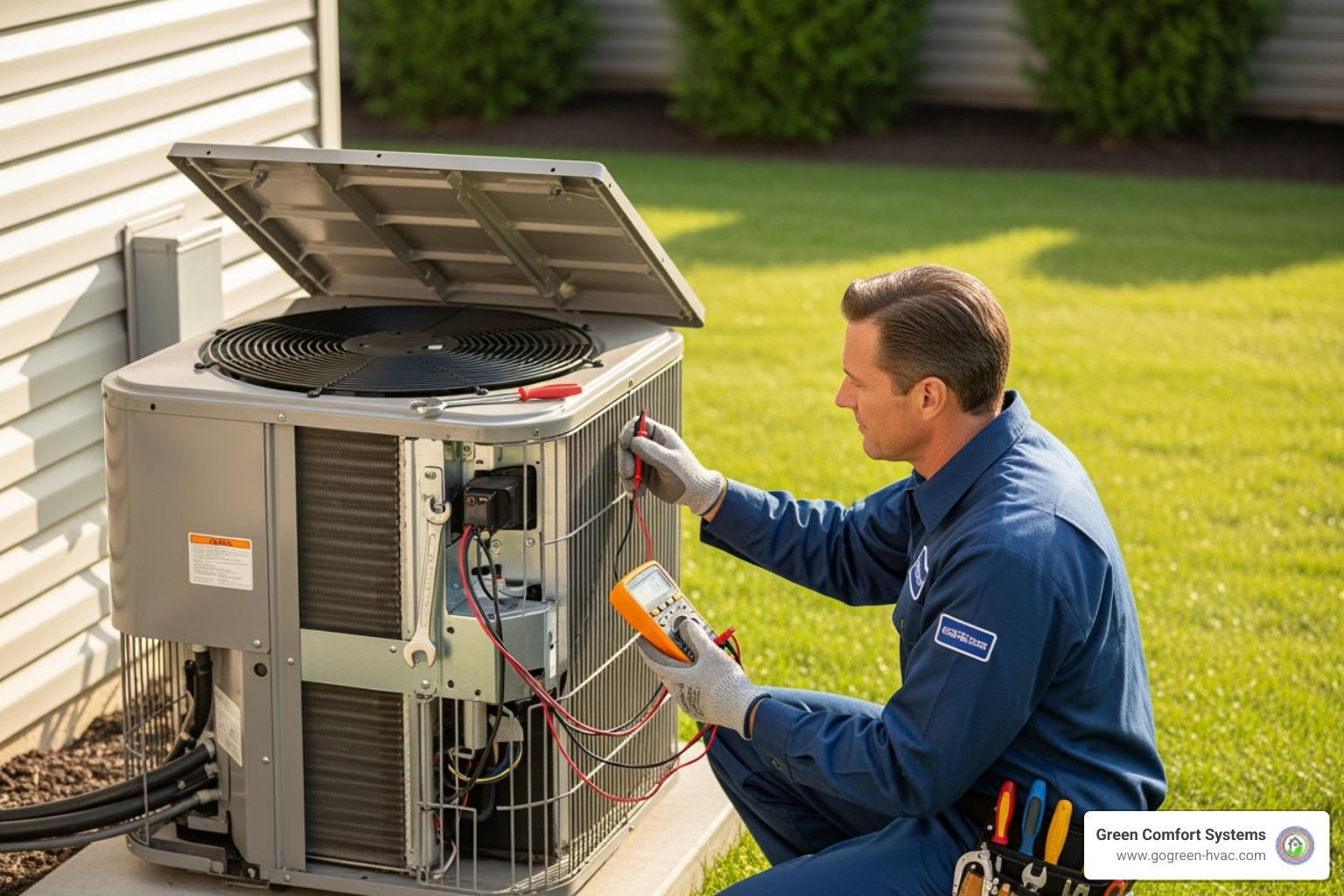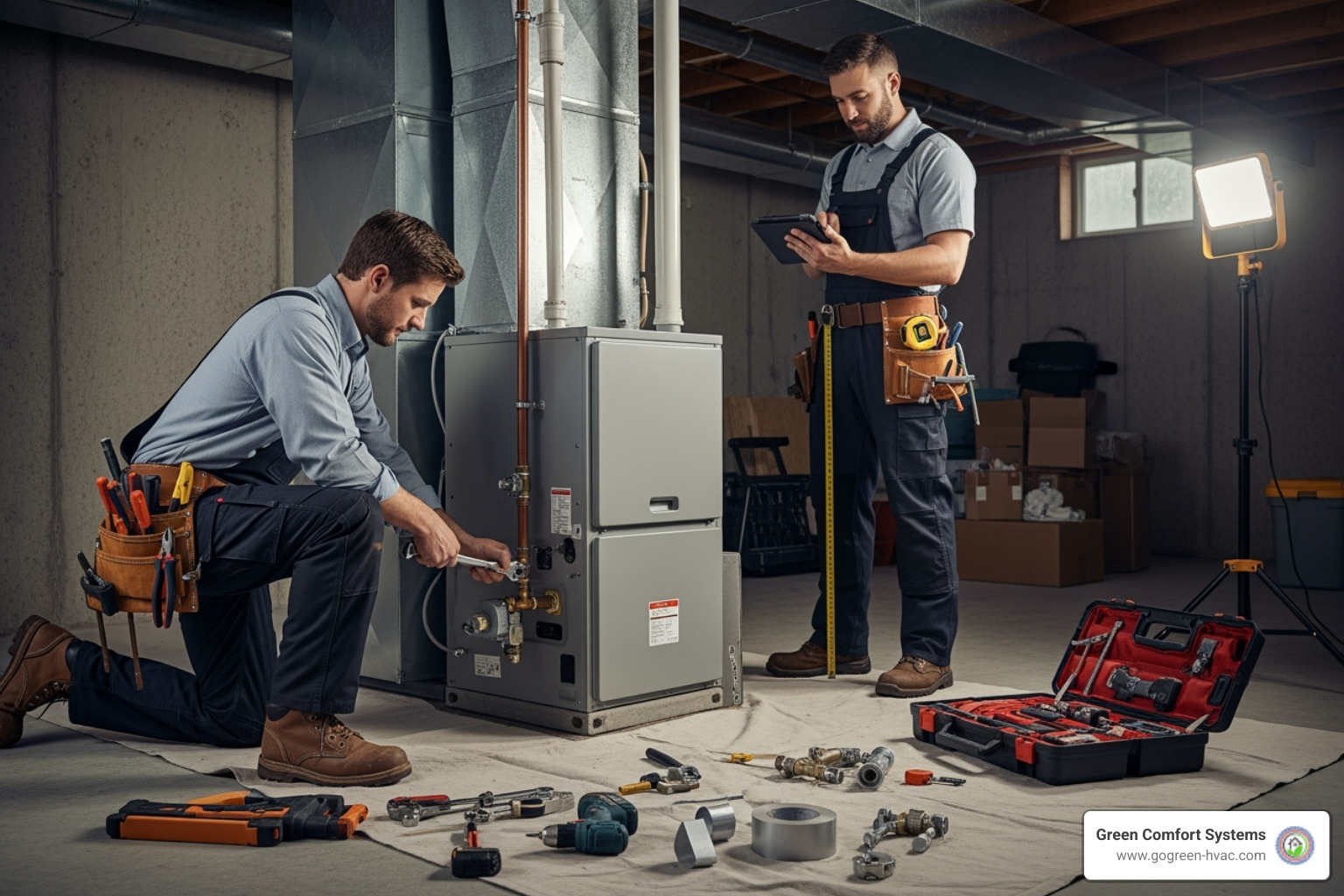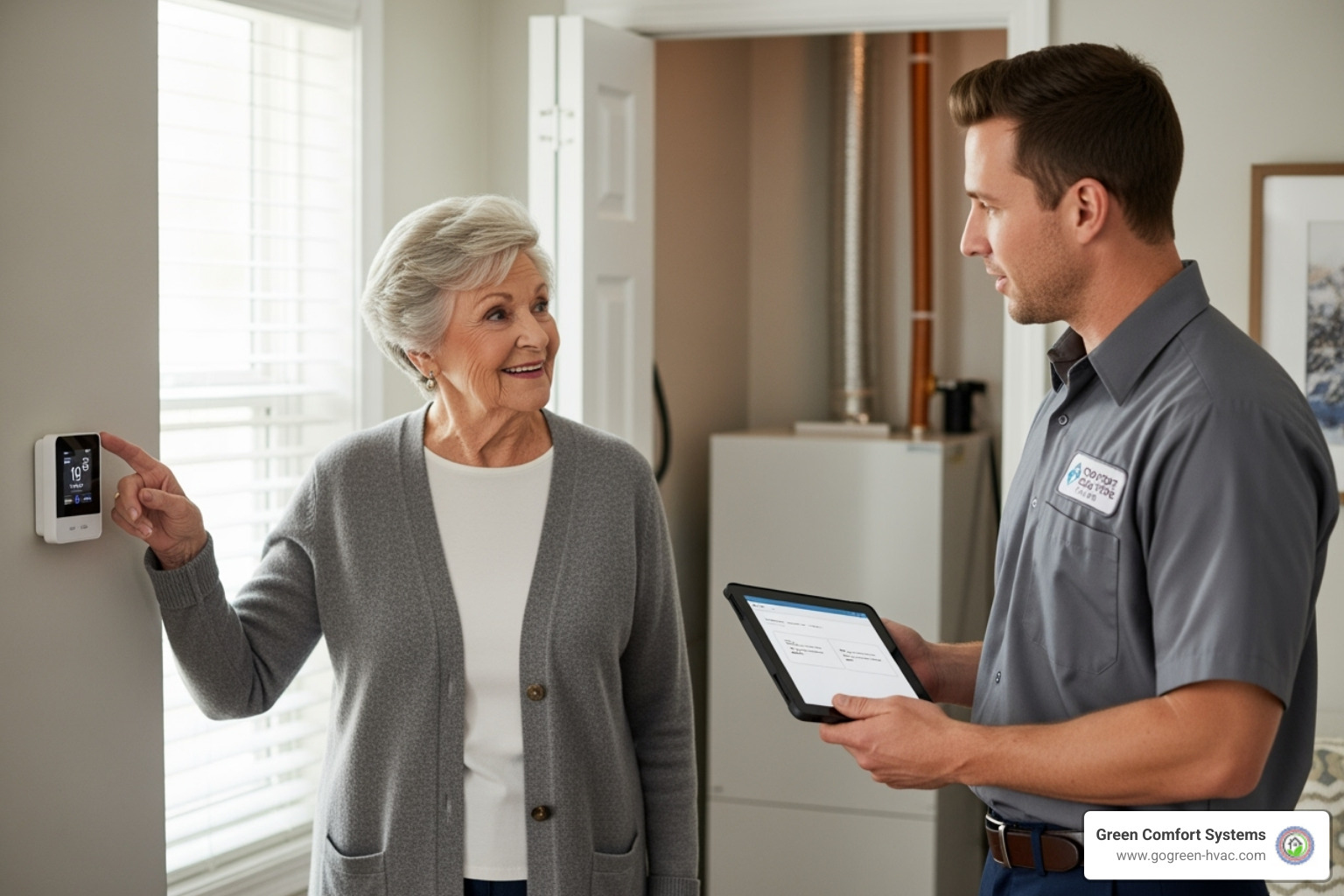Why Your HVAC Tech Needs a License: A Consumer's Guide

Why Licensed HVAC Technicians Are Essential for Your Home
When you need help with your heating or cooling system, calling Licensed HVAC technicians is not just a good idea, it's crucial for your home's safety and comfort. These professionals bring a proven level of skill and trustworthiness to every job.
Here’s why their license matters:
- Proves Skill and Knowledge: They have passed tough tests and met strict training rules.
- Ensures Safety: They know how to work with complex systems safely, protecting your home and family.
- Follows the Rules: They understand and follow all local and federal building codes.
- Protects You: Their license often means they are insured, giving you peace of mind.
Your home's heating, ventilation, and air conditioning (HVAC) systems are vital. They keep you warm in winter and cool in summer. They also ensure clean air inside your house. When these systems break down, it can be uncomfortable, costly, and even dangerous.
This guide will explain what it means for an HVAC technician to be licensed. We will cover the training, tests, and rules they must follow. You’ll learn how their official credentials make a big difference for your home and your peace of mind.
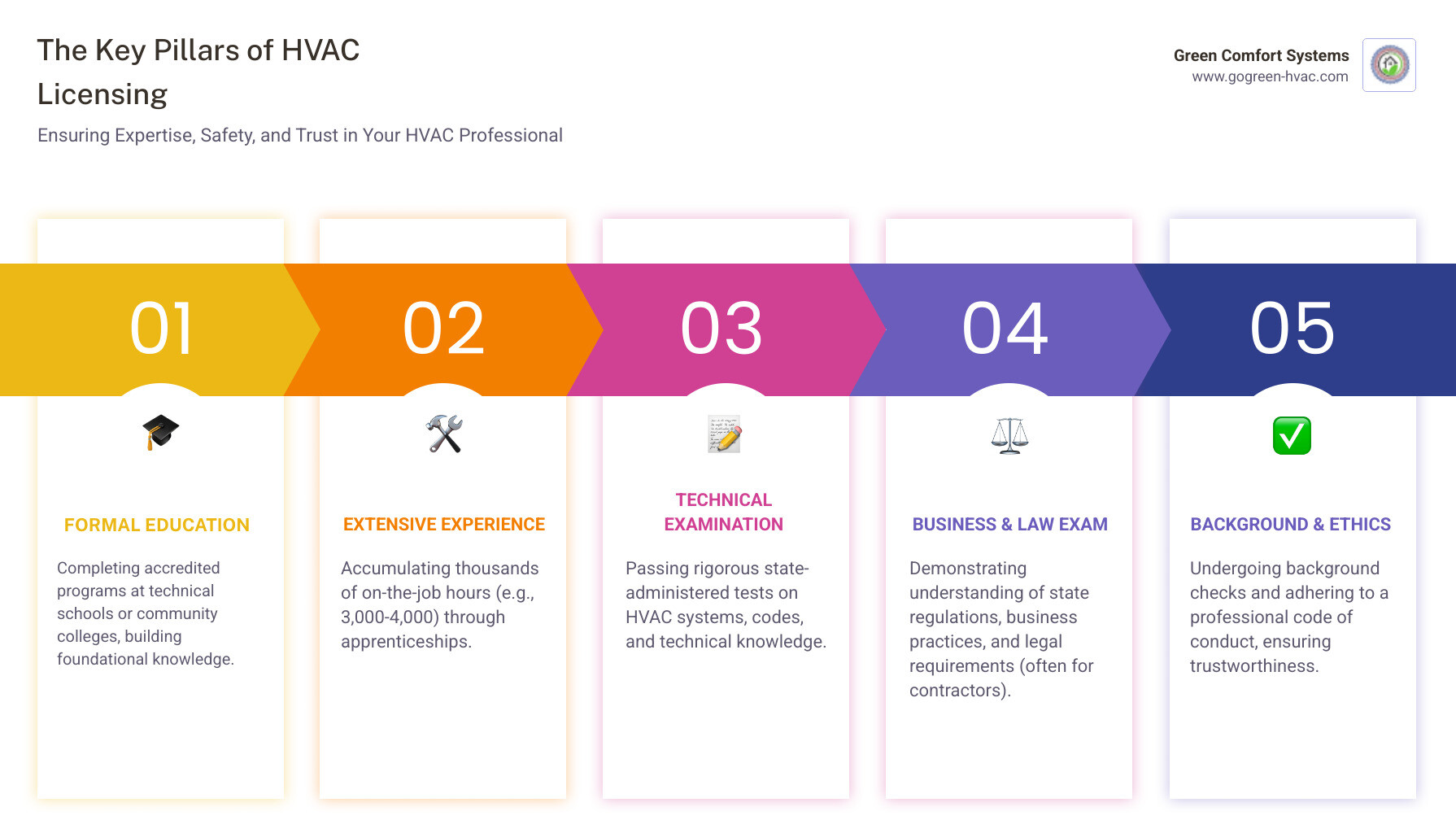
What "Licensed" Really Means: A Look Behind the Badge
When you see that Licensed HVAC technicians badge, you're looking at someone who has earned their stripes the hard way. State licensing boards don't hand out these credentials like candy – they're the tough gatekeepers who make sure only qualified professionals get to work on your home's complex systems.
Think about it this way: you wouldn't let someone without a medical license operate on you, right? The same logic applies to your HVAC system. These systems juggle electricity, gas lines, refrigerants, and intricate machinery all at once. One wrong move can be dangerous, expensive, or even harmful to the environment.
Every state has its own rules, and some cities add their own requirements on top. But the goal is always the same: protecting you, the homeowner. Take North Carolina – they're known for having some of the strictest HVAC licensing requirements in the country. When a technician makes it through their process, you know they're serious about their craft.
The future looks bright for these skilled professionals too. The Bureau of Labor Statistics reports a strong job outlook for HVAC technicians, with 9% growth expected over the next decade. That's faster than most construction trades, which tells you just how essential these professionals are. At Green Comfort Systems, we're proud that our team meets these high standards – you can learn more about our HVAC Services.
The Path to Becoming a Licensed HVAC Technician
Becoming a Licensed HVAC technician isn't something that happens overnight. It's more like a marathon than a sprint, combining classroom learning with real-world experience.
Most technicians start with formal education at community colleges or technical schools. These programs aren't just about learning which wrench to use – they dive deep into heating, cooling, ventilation, refrigeration, electrical systems, and safety protocols. Some students earn certificates, others go for diplomas, and many pursue two-year Associate's degrees.
But here's where it gets really interesting: apprenticeship programs let future technicians earn money while they learn. Working under experienced professionals, apprentices get hands-on training that no classroom can replicate. It's like having a mentor who shows you the ropes while you're actually on the job.
The experience requirements are no joke. In North Carolina, technicians need between 2,500 to 4,000 hours of documented work experience, depending on their license level. That's roughly 15 months to two years of full-time work. For contractor licenses, the bar is set even higher – they need two full years or 4,000 hours of hands-on experience.
There's one more step that gives homeowners extra peace of mind: background checks. Every licensed technician has passed a criminal background screening, so you know the person entering your home is trustworthy.
Passing the Test: Examination Requirements

After all that education and experience, there's still one final hurdle: state-administered exams. These aren't your typical multiple-choice tests – they're comprehensive evaluations designed to separate the truly knowledgeable from those who just think they know their stuff.
Many of these technical knowledge tests are "open-book," which might sound easy until you realize you need to know your reference materials inside and out. In North Carolina, candidates get four hours to complete their trade exam, and they can bring approved manuals and codebooks – but only if they're properly bound and tabbed. No loose papers, no handwritten notes, no shortcuts.
The real challenge isn't just knowing the answers – it's knowing where to find them quickly under pressure. Imagine flipping through hundreds of pages of technical codes while the clock is ticking. That's why experienced technicians spend months preparing, not just studying the material but learning to steer it efficiently.
For those aiming to become contractors, there's an additional challenge: business and law exams. These tests cover everything from legal obligations and financial management to safety regulations and business ethics. North Carolina gives contractors just 1.5 hours for this exam, testing whether they can run a compliant, ethical business – not just fix your air conditioner.
These exams aren't just bureaucratic hoops to jump through. They're the final gatekeepers ensuring that only the most prepared and knowledgeable professionals earn the right to be called Licensed HVAC technicians. If you want to see exactly what these requirements look like, visit the North Carolina State Board of Examiners for an example of exam details.
Understanding HVAC Credentials: Technician vs. Contractor
When we talk about Licensed HVAC technicians, it's important to understand that not all licenses are created equal. There's a clear hierarchy and different types of credentials, each with its own specific scope of work. For you, the homeowner, grasping this difference is incredibly important because it tells you who is qualified to handle various jobs on your property.
Think of it this way: an HVAC technician is usually the hands-on expert. They're the ones who roll up their sleeves, diagnose the tricky problems, perform routine maintenance, and get your system running smoothly again. They work diligently, often under the guidance of a licensed contractor or for a licensed HVAC company. Their license confirms they have the skills to install, service, and repair your heating and cooling equipment.
An HVAC contractor, on the other hand, holds a broader license. This allows them to run their own HVAC business, take on larger projects, manage other technicians, and oversee entire installations from start to finish. They are responsible for the big picture – from designing a new system for your home to ensuring all permits and regulations are met. They also carry the full liability and insurance for all the work their company performs. So, while a technician focuses on the "how-to," a contractor focuses on the "what-to-do" and "who-will-do-it."
Why does this distinction matter for homeowners like you? It ensures that complex projects, especially new installations or major overhauls, are managed by someone with extensive experience and a comprehensive understanding of both the technical and business sides of HVAC. For your everyday repairs and maintenance, a skilled Licensed HVAC technician is exactly what you need. But if you're starting on a major project or hiring an independent professional for a large job, you'll want to confirm they hold the appropriate contractor license. It’s all about matching the right expertise to the job!
Here's a quick comparison to help clarify the roles:
| Feature | HVAC Technician License | HVAC Contractor License |
|---|---|---|
| Scope | Performs hands-on installation, maintenance, service, repair under supervision. | Oversees, bids on, and executes projects; manages technicians; runs an HVAC business. |
| Requirements | Education, specific on-the-job experience (e.g., 2,500-3,000 hours), technical exam, background check. | More extensive experience (e.g., 4,000 hours), technical exam, business and law exam, insurance, bonding. |
| Responsibilities | Executes tasks, diagnoses issues, ensures system functionality. | Manages projects, ensures compliance, responsible for business operations and overall project quality. |
HVAC Technician and Contractor License Types
Beyond the technician-contractor distinction, HVAC licenses can also get pretty specific, often based on the type of system or the project's scale. North Carolina, for instance, offers a fantastic example of how detailed these classifications can get.
In North Carolina, HVAC work is broken down into three main heating groups:
- H1: This group covers water-based heating systems, like boilers and hydronic heating.
- H2: This is for larger forced-air units, specifically those over 15 tons – think bigger commercial buildings.
- H3: This group includes all other heating systems 15 tons or less, which typically covers most residential furnaces and heat pumps.
On top of these groups, there are also different classes that dictate the project size:
- Class I: Allows professionals to work on residential, commercial, and industrial projects – the sky's the limit!
- Class II: Restricts work to residential-only projects. This is what you'll commonly find for home HVAC services.
So, you might encounter licenses like H1-I (meaning a professional can work on water-based heating systems for any size project) or H3-II (qualified for residential forced-air heating systems under 15 tons, perfect for your home). This detailed classification ensures that professionals truly specialize in the systems they're working on. For instance, understanding these nuanced categories is essential when dealing with specialized equipment like Heat Pumps.
It’s also worth noting that some states offer specific licenses for refrigeration contractors. These experts specialize in commercial refrigeration units, ensuring that grocery stores, restaurants, and other businesses can safely store their temperature-sensitive goods. All these specific credentials reinforce why you need a specifically Licensed HVAC technician for your particular needs – they've got the exact expertise required!
Mandatory Federal EPA Certification
There's one certification that every Licensed HVAC technician who handles refrigerants must possess, no matter what state they're in: the EPA Section 608 Certification. This isn't a state-specific rule; it's a federal requirement set by the Environmental Protection Agency (EPA) under the Clean Air Act.
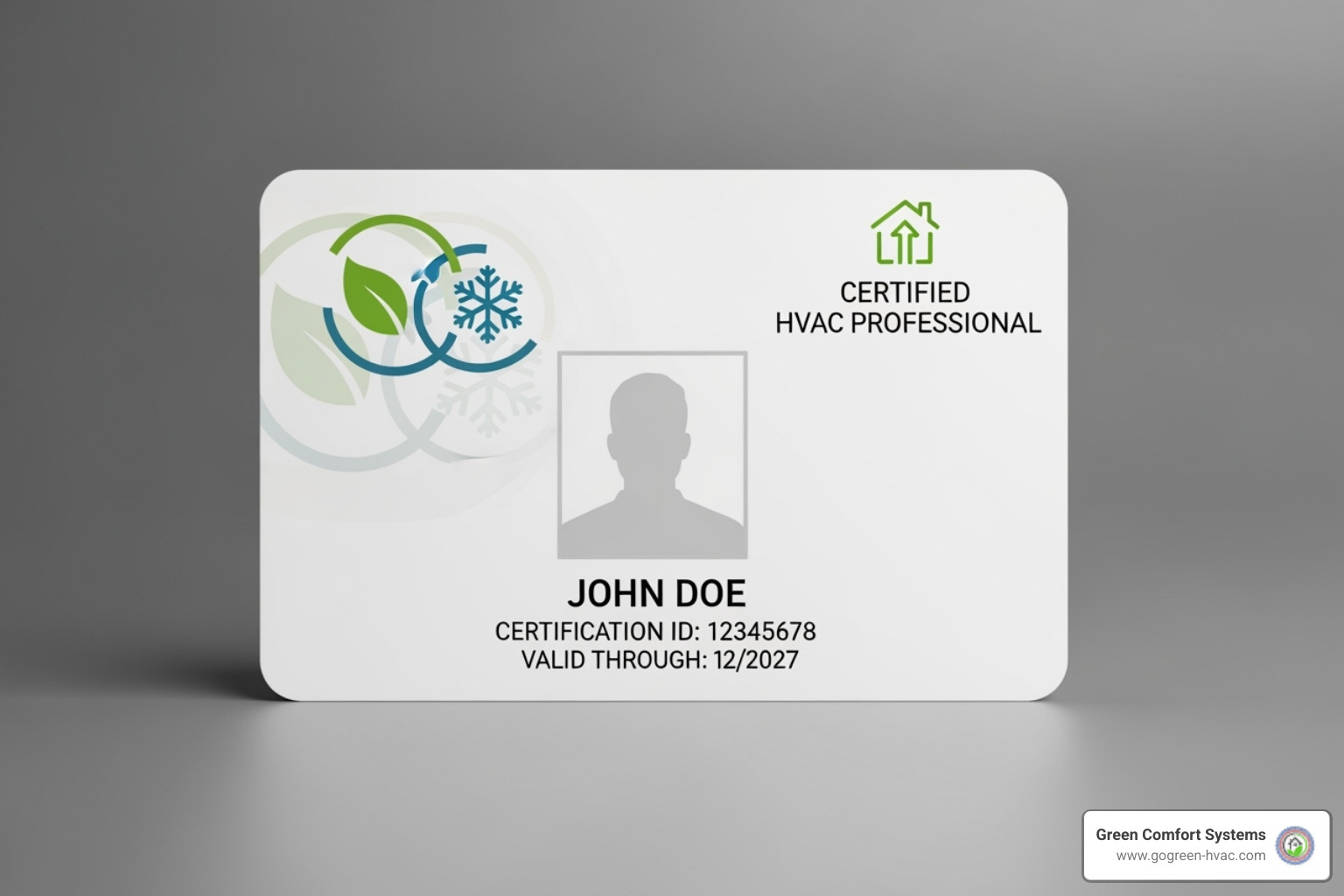
This certification is absolutely crucial for anyone who maintains, services, repairs, or disposes of equipment that contains refrigerants. Why? Because refrigerants, while vital for cooling, can harm our planet's ozone layer and contribute to climate change if they leak into the atmosphere. The EPA certification ensures that technicians understand the proper procedures for recovering, recycling, and reclaiming these refrigerants, which helps minimize their environmental impact. This is where our commitment to being "Green" truly shines, ensuring we protect the planet while making your home comfortable.
There are different types of EPA Section 608 certifications, each for specific equipment:
- Type I: For servicing small appliances, like window AC units or refrigerators, that hold 5 pounds or less of refrigerant.
- Type II: For servicing larger high-pressure appliances, such as your residential and most commercial air conditioners.
- Type III: For servicing or disposing of low-pressure appliances, typically large chillers found in commercial buildings.
- Universal: This combines all three types, allowing a technician to work on any type of equipment containing refrigerant.
Every Licensed HVAC technician and contractor who works with refrigerants must pass an EPA-approved test. This test covers important topics like ozone depletion, the Clean Air Act, Section 608 regulations, new eco-friendly refrigerants, proper recovery techniques, and safety. This ensures that environmental responsibility is always a top priority in their work. You can find more details on these requirements directly from the EPA. Our dedication to sustainability also extends to helping you find eco-friendly HVAC equipment options for your home.
Why You Should Only Hire Licensed HVAC Technicians
When your air conditioner breaks down on the hottest day of summer, or your furnace gives up during a winter storm, it's tempting to call the first person who promises a quick fix. But here's the thing – choosing Licensed HVAC technicians isn't just about following rules or checking boxes. It's about making sure your family stays safe, comfortable, and protected.

Think about it this way: you wouldn't let an unlicensed electrician rewire your house, would you? HVAC work involves the same level of complexity and risk. Your heating and cooling systems connect to gas lines, electrical circuits, and contain pressurized refrigerants. One wrong move by someone who doesn't know what they're doing, and you could face dangerous gas leaks, electrical fires, or toxic refrigerant exposure.
Licensed HVAC technicians bring something invaluable to your doorstep: proven expertise. They've spent years learning their craft, passed rigorous exams, and demonstrated they can handle complex problems safely. When you see that license, you're not just looking at a piece of paper – you're seeing proof that this person has what it takes to keep your family safe.
Beyond safety, there's the matter of getting your money's worth. Licensed professionals understand building codes, know how to size equipment properly, and follow industry best practices. This means your system will work efficiently, last longer, and keep your energy bills reasonable. Plus, if something does go wrong, licensed contractors typically carry insurance and bonding that protects you from unexpected costs.
The Benefits of a Licensed Professional
Let's talk about what you really get when you choose a licensed professional for your HVAC needs. It's not just about feeling good – there are real, tangible benefits that protect both your home and your wallet.
Building code compliance might sound boring, but it's actually your best friend. These codes exist for good reasons: they prevent fires, ensure proper ventilation, and make sure systems work efficiently. Licensed professionals know these rules inside and out, while unlicensed workers might not even know they exist. When your system meets code, you avoid failed inspections, costly do-overs, and potential safety hazards.
Proper equipment sizing is where licensed professionals really shine. Have you ever been in a house where one room is freezing while another is sweltering? That's often the result of poor equipment sizing or installation. Licensed technicians use precise calculations to determine exactly what your home needs. Too small, and your system will work overtime trying to keep up. Too big, and it'll cycle on and off constantly, wasting energy and wearing out faster.
Here's something many homeowners don't think about until it's too late: insurance and bonding protection. Licensed contractors are required to carry these protections, which means if an accident happens during the work, or if the job isn't done correctly, you're covered. Without this safety net, you could be stuck paying thousands to fix problems caused by the very person you hired to help.
And don't forget about your warranty coverage. Most HVAC manufacturers will only honor their warranties if the equipment is installed and maintained by licensed professionals. Skip the license requirement, and you might void your warranty before you even get to enjoy your new system. That's a risk that's simply not worth taking, especially when you consider the cost of major HVAC equipment.
When you need reliable Air Conditioning Services, choosing licensed professionals ensures you get all these protections working in your favor.
Salary and Career Growth for Licensed HVAC Technicians
You might wonder why this matters to you as a homeowner, but understanding the career prospects for Licensed HVAC technicians actually tells you a lot about the quality of service you can expect. When a field offers good pay and solid career growth, it attracts dedicated, skilled professionals who take pride in their work.
The numbers tell an encouraging story. The Bureau of Labor Statistics shows that HVAC careers are growing much faster than average – about 9% nationally over the next decade. In states like North Carolina, that growth jumps to 13%, with over 1,700 new positions opening up each year through 2030. This isn't a dying trade – it's a thriving, essential industry.
Higher earning potential comes with licensing, and that benefits you directly. In North Carolina, licensed technicians earn between $26,000 and $81,000 annually, with the average sitting around $53,400. Experienced technicians with specialized skills can earn over $80,000. Those who advance to contractor roles see even better rewards, with average salaries around $111,000 and top earners making nearly $145,000.
Why does this matter for your home repair? Simple: good pay attracts good people. When professionals can build stable, well-paying careers, they stick around, gain experience, and continually improve their skills. The technician who comes to your home isn't just someone looking for quick cash – they're building a career they can be proud of.
This career stability also means you're more likely to find experienced professionals when you need them. The industry's growth and competitive wages help ensure there are skilled Licensed HVAC technicians available to keep your home comfortable year-round.
Frequently Asked Questions about HVAC Licensing
We understand that diving into HVAC licensing can feel a bit like navigating a maze. It’s full of terms and rules that might seem confusing at first! To help clear things up, here are some of the most common questions we hear. Our goal is to make sure you feel confident and informed when choosing someone to care for your home's comfort system.
What kind of work can an unlicensed person do?
This is a really important question, and the answer can vary quite a bit depending on where you live. Every state and even local town has its own set of rules. Generally speaking, any serious work on your HVAC system, like dealing with refrigerants, connecting to gas lines, or handling high-voltage electricity, absolutely requires a Licensed HVAC technician. These are complex and potentially dangerous tasks that demand expert knowledge and training.
In some places, very minor work might not legally require a license. For example, in North Carolina, a job costing less than $30,000 technically doesn't need a contractor's license. However, even for these smaller jobs, we strongly recommend hiring a licensed professional. Why? Because safety, quality, and following all the rules are important, no matter the job's size! An unlicensed person might be able to help with super basic things, like changing air filters or simply cleaning the outdoor unit. But even these simple tasks can cause bigger problems if not done correctly. The risks of hiring someone unlicensed — from improper work to safety hazards and no insurance — far outweigh any small savings you might think you're getting.
How can I verify if an HVAC technician is licensed?
Verifying a technician's license is a smart and crucial step to protect your home and ensure you're getting top-notch service. Luckily, most states and many local areas make this process quite easy.
The best way to check a license is to visit the relevant state or local licensing board's website. Most of them have a public search tool. You can usually type in a technician's or company's name, or even their license number, to see their current status. For instance, if you're in North Carolina, you can use the public search on the State Board of Examiners of Plumbing, Heating, and Fire Sprinkler Contractors website.
Before any work begins, always ask the technician or the company for their license number. A trustworthy, Licensed HVAC technician will be happy to share this information with you. If they seem hesitant or refuse, consider that a big red flag! Taking a few moments to look up their license online can save you a lot of worry and potential problems down the road.
How often do licenses need to be renewed?
Think of an HVAC license not as a one-time achievement, but as an ongoing promise of professionalism! Licenses aren't forever; they need regular care to stay valid. Most licenses need to be renewed every year, though the exact timing can vary a little from state to state.
This yearly renewal process serves a few important purposes. First, it makes sure the professional continues to meet all the rules and stays in good standing with the licensing board. Second, renewing often involves a fee, which helps fund the board's work in keeping standards high. In North Carolina, for example, HVAC technician and contractor licenses are good for one year and have an annual renewal fee ($75 for technicians, $150 for contractors).
While continuing education isn't always a must-do for renewal in every state, it's highly, highly recommended. Many Licensed HVAC technicians choose to take extra classes and earn new certifications. This helps them stay up-to-date with the latest technology, new regulations, and the best ways to do their job. This dedication to always learning means your technician is always equipped with the newest knowledge to give you the best possible service!
Conclusion
When you're dealing with your home's heating and cooling needs, the choice is clear: always go with Licensed HVAC technicians. As we've seen throughout this guide, that license represents so much more than a simple credential hanging on the wall.
It's proof of dedication – years spent learning the trade, thousands of hours gaining hands-on experience, and the commitment to pass challenging exams. It shows they understand the intricate dance between electrical systems, gas lines, and refrigerants that keeps your home comfortable and safe.
Most importantly, choosing licensed professionals gives you something invaluable: peace of mind. You know the work will be done right, following all safety codes and regulations. You're protected by insurance and bonding. Your equipment warranties stay valid. And if something goes wrong, you have recourse.
The benefits are clear: safety from proper handling of complex systems, quality from proven expertise, and accountability from regulated professionals who stake their reputation on every job. Licensing demonstrates a commitment to professionalism that separates the true experts from those who are just "handy with tools."
Your home deserves nothing less than qualified experts, especially when it comes to essential systems like your Heating Services. At Green Comfort Systems, we understand this responsibility deeply. We are committed to the highest standards of service and expertise, which is why our entire team consists of dedicated Licensed HVAC technicians.
We believe every homeowner in our community deserves the confidence that comes with professional service. For reliable and professional AC repair in Ellicott City and surrounding areas, contact our team of licensed experts. When your comfort is on the line, trust the professionals who've earned the right to call themselves licensed.
Book Expert Service Or Contact Us
Other Blogs





Get Financing Today
Get the comfort you deserve, without the financial stress.

Latest Blogs







